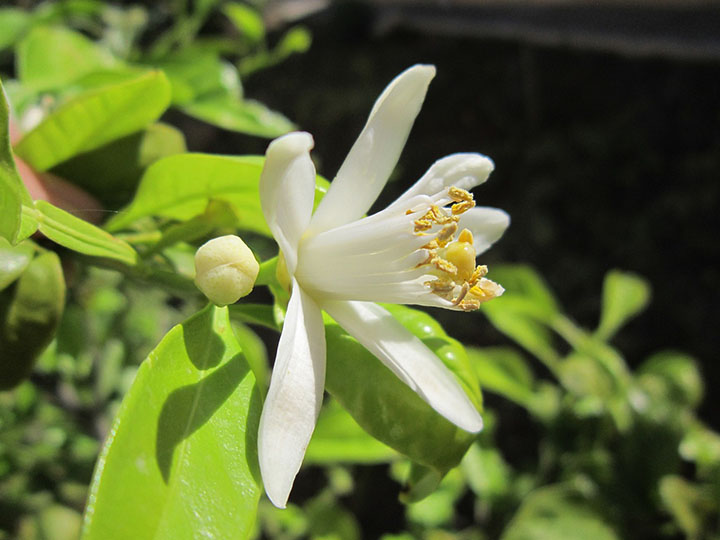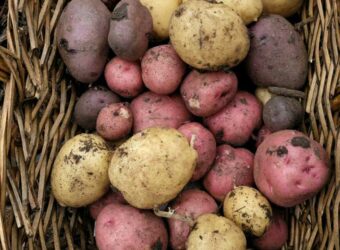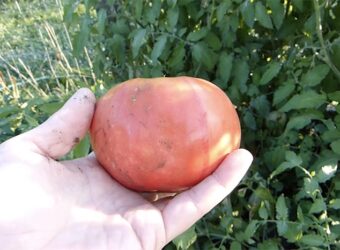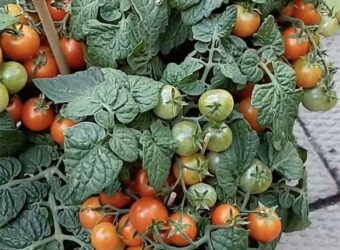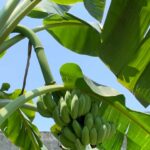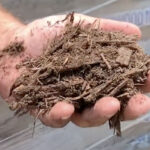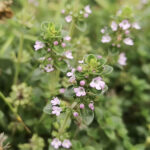Lemon trees are fun to grow. Even if you live in a climate that is too cold to grow lemon trees outdoors, you can grow one indoors. This guide will tell you about the best fertilizers for your lemon trees.
Why Fertilize Lemon Trees?
Lemon trees are heavy feeders in the landscape and in pots. Even in-ground lemon trees will need more nutrients than the soil can provide year after year without fertilizer. Lemon trees grown in pots depend on fertilizer for almost all their nutrients, as the nutrients in the potting soil are soon used up.
Types of Fertilizer For Lemon Trees
Fertilizer for lemon trees comes in many different forms. Here are the most common.
Liquid Fertilizer
Liquid fertilizer can be used as a drench to soak the soil around the lemon tree or as a foliar spray that is sprayed on the leaves of the lemon tree. You can buy liquid fertilizers that are ready to use or concentrates that need to be mixed. Most liquids start working immediately and last about two weeks.
Water Soluble Fertilizer
Water-soluble fertilizers are granules that dissolve completely in water. They are then used just like liquid fertilizers.
Granular Fertilizer
Granular fertilizers may look like little rocks or like pellets. They are spread on the surface of the soil and then mixed in the first few inches of soil. Most require water to work, so the area they are spread must be irrigated soon after spreading the fertilizer. This also prevents the fertilizer from burning the lemon tree. Quick-release fertilizer starts working immediately and lasts about two weeks. Most granular fertilizers are a mixture of quick-release and slow-release fertilizers.
Slow-Release Fertilizer
Slow-release fertilizer is coated with a substance that gradually breaks down. As the coating breaks down, it releases nutrients to the plant. Slow-release fertilizer starts working about two weeks after it is spread and, depending on the coating, can work for up to six months.
Spikes
Spikes are simply slow-release granules that are formed into the shape of a spike. They are driven into the ground along the dripline of the plant.
Organic Versus Synthetic
Organic fertilizers are made with natural ingredients. However, they have to undergo a review by a certifying agency to be certified organic. These fertilizers feed soil microbes that break the nutrients into forms available to the lemon tree.
Synthetic fertilizers are made in the laboratory. They are more powerful than organic fertilizers and are usually cheaper. Synthetic fertilizers feed the lemon tree directly. They do not feed the soil microbes, who will die of starvation after several years of only using synthetic fertilizer.
Things To Consider When Choosing Fertilizer for Lemon Trees
There are several things I consider when choosing a fertilizer for a lemon tree.
Ratio
The ideal NPK ratio is 2-1-1. Most fertilizers for lemon trees are some multiple of this, such as 6-3-3 or higher. Read my article to know what these numbers mean.
Acidity
Lemon trees prefer acidic soil at a pH of 5.5-6.5, so I chose a fertilizer for lemons, citrus, or for acid-loving plants. Using a regular fertilizer can leave the soil too alkaline for lemon trees.
Type of Lemon Tree
There are three types of lemon trees people grow. True lemon trees are usually varieties of ‘Eureka’ or ‘Lisbon’. Eureka has lemons in the spring and summer, while Lisbon has lemons in the summer and fall. Ponderosa is not a true lemon but tastes similar. It is rather small and thorny. Meyer is also not a true lemon but tastes similar. It has less acid than other lemons. Meyer is a dwarf variety and is often grown inside in a pot. All three types of lemon trees are fertilized the same.
Top 5 Best Lemon Tree Fertilizers
Here are my picks for the best fertilizers for lemon trees.
1. J R Peters Inc Jacks Classic 20-10-20 Citrus Food Fertilizer – Best Budget Fertilizer For Lemon Trees

J R Peters Inc Jacks Classic 20-10-20 Citrus Food Fertilizer is my pick for the best budget fertilizer for lemon trees. The NPK ratio is 20-10-10, and it also includes magnesium, sulfur, boron, copper, iron, manganese, molybdenum, and zinc. You won’t need to add anything but water to get healthy plants that bear well. This is a water-soluble fertilizer. The ingredients are the highest quality ingredients available. The package says the formula will produce vibrant green leaves, strong branches, and lots of fruit. It also says when used as directed, this fertilizer will enable your lemon tree to absorb nutrients from its roots and leaves. This fertilizer is made in the USA. It is not organic. Keep out of reach of pets and children. There is a pamphlet and measuring spoon in every tub with exact instructions for fertilizing your lemon tree.
J.R. Peters was founded in 1947 in Allentown, Pennsylvania. It is currently run by the fourth generation of the family. They produce fine water-soluble fertilizers for professionals and homeowners.
To use J R Peters Inc Jacks Classic 20-10-20 Citrus Food Fertilizer, mix one tablespoon of fertilizer into one gallon of water. Drench the soil every seven to ten days.
Alternatively, mix one teaspoon of fertilizer into one gallon of water and use the solution instead of water every time you water your lemon tree. Drench the soil with the solution.
My Dad used to have a tub of Peters Professional Plant food when I was a kid, so I have known about this company for a long time. J R Peters Inc Jacks Classic 20-10-20 Citrus Food Fertilizer is a good option for those of us who have a tight budget because it is not expensive, and a tub lasts a long time. I find it easy to mix and use. I only mix the amount I plan to use that day so the solution doesn’t get old. I have found that you can burn your plants if you mix this fertilizer too strongly, so follow the directions closely. Although the label says the plant can absorb nutrients through the roots and leaves, I am careful not to get this fertilizer on the lemon tree. It is not a foliar feed. I have found the granules can clump and become hard as a rock, making it hard to chip off enough to mix with my water. The tub holds a lot of fertilizer but is not very big, so it is easy to store.
Pros:
- Inexpensive
- Reputable Company
Cons:
- Can burn your plants
- Have to use every 7-10 days
2. Down to Earth Organic Citrus Fertilizer Mix 6-3-3 – Best Organic Fertilizer For Lemon Trees

Down to Earth Organic Citrus Fertilizer Mix 6-3-3 is my pick for the best organic fertilizer for lemon trees. It has an NPK ratio of 6-3-3 and contains calcium, sulfur, iron, and zinc. These nutrients combine to give your lemon tree lush growth, dark green foliage, and lots of lemons. The fertilizer also includes humic acid from Leonardite, the best source. Humic acid is a soil conditioner that will make your soil have a better structure so air and water can permeate it easier. This fertilizer has premium contents such as alfalfa meal and fish meal to really feed your lemon tree. The package is made of 100% recycled cardboard and printed with vegetable-based inks, so it is completely biodegradable. The company urges you to shred it and put the package in your compost pile. Keep out of reach of pets and children. The fertilizer is certified organic.
Down to Earth was founded in 1977 in Eugene, Oregon, to give homeowners good, organic fertilizers. They take pride in offering only the finest organic ingredients obtained in a sustainable way. They make a range of fertilizers and soil conditioners.
To use Down to Earth Organic Citrus Fertilizer Mix 6-3-3 on in-ground lemon trees, apply one cup per one inch of trunk diameter, measured at four feet from the ground. Spread in a band from the trunk to the edge of the drip line. Do not let the fertilizer touch the trunk. Water the area after spreading the fertilizer. Use this fertilizer three times a year at this rate each time.
For container lemon trees, apply 2-4 tablespoons per gallon of soil. Apply this fertilizer four to six times a year. Water the lemon tree after spreading the fertilizer and working it into the top inch of soil in the container.
I think this is a good option if you want an organic fertilizer. I appreciate the biodegradable box and the efforts of this company to be sustainable. The humic acid in Down to Earth Organic Citrus Fertilizer Mix 6-3-3 keeps the soil nice and acid for my lemon trees. I like that the ingredients are high quality, and I can pronounce them. A pound of this fertilizer is not expensive, but you may have to buy several packages if you have a lot of trees to fertilize. On the plus side, I don’t have to lug heavy bags of fertilizer out to my lemon trees.
Pros:
- Organic
- Premium contents
- Biodegradable container
Cons:
- Small package
3. Jobe’s, 01612, Fertilizer Spikes, Fruit and Citrus – Best Fertilizer Spike For Lemon Trees
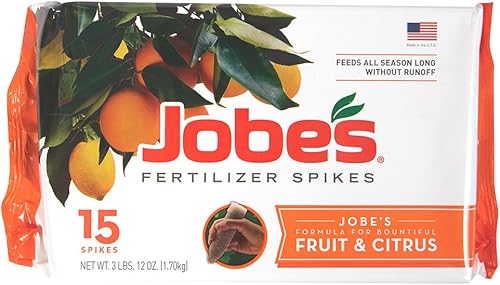
Jobe’s, 01612, Fertilizer Spikes, Fruit and Citrus is my pick for the best fertilizer spike for lemon trees. It has an NPK ratio of 9-12-12. These pre-measured spikes come with just the right nutrients for your lemon tree. Just hammer them into the ground around the dripline and forget them. You won’t have to worry about fertilizer runoff or frequently applying fertilizer. Keep the spikes out of the reach of children and pets. These spikes are not organic. They are made in the USA.
Jobe’s is owned by The Jobe’s Company, headquartered in Waco, Texas. They have additional manufacturing facilities in Kentucky. Jobe’s line of fertilizers and plant spikes includes over 200 types and is sold throughout North America.
Before using Jobe’s, 01612, Fertilizer Spikes, Fruit and Citrus, water the area around the tree well. Using the plastic cap included with the spikes, hammer the spike into the ground around the drip line. When the spike is level with the soil, remove the cap and hammer the spike at least two more inches into the ground. To know how many spikes to use, measure the tree diameter one foot from the soil. For one to two inches in diameter, use two spikes equal distance from each other. For each inch increase in diameter, use one more spike, so for five inches of diameter, use five spikes. Place in early spring and late summer, about six months apart.
Spikes are easy to use and convenient. I like not having to worry about the fertilizer for most of the year. These spikes are only for outdoors or in a really big container because you cannot place the spikes closer than 30 inches from the trunk. For indoor or potted lemon trees, use one of the other fertilizers I review. Spikes sometimes come broken or crumbled in the package. I have also broken them while trying to drive them in the ground. However, losing a spike now and then doesn’t cause me to stop using them. People like spikes, so I have mentioned these. However, I would prefer the Espoma Organic Citrus tone to these because they have too little nitrogen for the phosphorus and potassium. Sometimes when you buy a spike or fertilizer intended for a wide variety of plants, it ends up not being exactly perfect for any of them. However, they are still okay for a lemon tree. They are not very expensive and have 15 spikes per package, so unless you have a lot of fruit and citrus trees, one package will last a while.
Pros:
- Easy to use
- Lasts a long time
- No runoff worries
Cons:
- Can break easily in the package or while pounding in
- Needs more nitrogen
4. Lemon Tree Fertilizer for Lemon Trees and Citrus – Best Fertilizer For Indoor Lemon Trees

Lemon Tree Fertilizer for Lemon Trees and Citrus, Liquid Plant Food 8 oz is my pick for the best fertilizer for indoor lemon trees. The NPK ratio is 3.6-3-5.1. The fertilizer also contains calcium, magnesium, sulfur, boron, copper, iron, manganese, and zinc. This fertilizer should be kept in a cool, dark place and be used within the first 12 months of purchase. Keep this fertilizer away from children and pets. Do not get the fertilizer on your skin or inhale the fumes. The label says the specially formulated fertilizer will cause your tree to have lots of juicy lemons with good yellow skin and strong, lush leaves. It can be used as a drench or as a foliar spray. This product is not organic.
TPS Plant Foods makes the Lemon Tree Fertilizer. They have over 25 years of experience in plant foods. Their goal is amazing growth through better fertilizers.
There are three ways to use Lemon Tree Fertilizer for Lemon Trees and Citrus, Liquid Plant Food 8 oz. First, for a watering can, add two tablespoons of fertilizer to one gallon of water. Use as a drench, soaking the soil around the lemon tree. Use every week or two in the spring and summer and every four weeks in the fall and winter.
For a hose-end sprayer, set the dial to one ounce and fill the sprayer. Attach to the hose and soak the ground around the lemon trees. Use every week or two from early spring to late summer, then use every month for the fall and winter.
Finally, for a foliar spray, put one tablespoon of fertilizer into one quart of water. Spray the leaves with the mixture once every one to two weeks year-round.
I prefer liquids for potted plants because they are easier to use. Simply mix the fertilizer with water and use it in place of watering the lemon tree every week to two weeks. This liquid can even be used as a foliar spray. Don’t use it as both a foliar spray and a drench, or you will over-fertilize your lemon tree. Be careful to follow the directions when mixing the fertilizer because it can burn your lemon tree if mixed too strongly. I only mix enough for that day so the solution doesn’t spoil. I think this fertilizer is moderately expensive, given the size of the bottle and frequency of use. If you are on a tight budget, J R Peters Inc Jacks Classic 20-10-20 Citrus Food Fertilizer might be a better choice.
Pros:
- Easy to use
- Developed just for lemon trees
Cons:
- Frequency of use
- A little pricey
5. Espoma Organic Citrus-Tone – Best Overall Fertilizer For Lemon Trees

Espoma Organic Citrus-Tone is my pick for the best overall fertilizer for lemon trees. It has an NPK ratio of 5-2-6 with calcium, magnesium, and sulfur. This fertilizer has a large number of soil microbes in it to make the nutrients in the fertilizer more available to your lemon tree. It also has humic acid made from Leonardite to condition and acidify the soil. Store this fertilizer in a cool, dry place out of reach of pets and children. This is a certified organic fertilizer and can be used in organic gardening.
Espoma was founded in 1929 in Millville, NJ. They have developed a full line of certified organic specialty fertilizers that are made in the USA. The products are available in North America.
To use for in-ground lemon trees, measure the height of the lemon tree. Spread the fertilizer in a band around the tree from at least six inches away from the trunk to the drip line. For a tree under 3 feet, use six cups. For a tree 3-6 feet, use twelve cups. For a tree 7-9 feet tall, use eighteen cups. For trees over nine feet tall, use twenty-four cups of fertilizer. Mix the fertilizer into the top inch or two of the soil. Water thoroughly after spreading the fertilizer around the tree. Use in early spring, late spring, and late summer.
For potted plants, use sprinkle one teaspoon of fertilizer per four inches of pot diameter around the inside of the pot and scratch it into the top inch of soil. Double that rate for pots over twelve inches. Water the lemon tree well after fertilizing. Use every four weeks during the growing season.
I like Espoma products and use them when they are available. I do worry about adding foreign soil microbes to my soil and whether they could outcompete the native microbes but have not seen any soil problems from that. The number of live microbes decreases the longer the fertilizer has been packaged, so buy a small package and use it up before getting another one. I would not store this fertilizer over the winter but would buy a new package each spring. While most of the nitrogen is released slowly, you can burn your plant with this fertilizer if you over-apply it. As with most organic fertilizers, Espoma Organic Citrus-Tone is a bit pricey, but I do not think it is unreasonably so, especially since one bag goes a long way.
Pros:
- Organic
- Has soil microbes added
Cons:
- Pricey
When Do I Fertilize My Lemon Tree?
To get the best results with fertilizer, you can’t just dump it in without considering the following factors.
Best Time of Day
I always fertilize my lemon tree in the morning before 10 am. This allows the tree to dry before nightfall if I get any water on it when watering in the fertilizer. If the tree is wet during the night, it is more likely to get a fungal disease than if it is dry.
Time of Year
Lemon trees are fertilized three times a year: Spring, early summer, and late summer. The exact dates of the fertilization will depend on where you live. The spring fertilization should be when new growth appears. Do not fertilize in the fall or winter. Fertilizing in the fall leads to tender new growth, which can freeze or otherwise die in the winter. Lemon trees are dormant in the winter, even when kept inside all year.
How Do I Fertilize My Lemon Tree?
How you fertilize your lemon tree depends on the fertilizer you choose, whether the tree is in-ground or in a container, and the age of your lemon tree. I recommend using Ammonium Sulfate, Ammonium Phosphate, or Citrus Food fertilizer. Divide the total amount of fertilizer per year into at least three applications.
New Trees 1-3 Years Old
Do not put fertilizer in the hole when you plant your lemon tree. Doing so burns the roots and voids the warranty most nurseries offer for the tree. Wait until new growth appears on the tree for the first fertilization. For in-ground trees, use a single cupful of ammonium sulfate divided into three applications. In the second year, increase the total amount to two cups, and three in the third year. If you use a different fertilizer, follow the label directions.
For newly potted plants, wait until the first growth appears. Fertilize with a tablespoon of ammonium sulfate per cubic foot of soil. Sprinkle the fertilizer on the soil. Mix the fertilizer into the top inch of soil and water the plant. Repeat every month during the growing season.
Older Trees
In-ground trees should be given the number of cups of ammonium sulfate that the tree is old. For example, a six-year-old tree gets six cups of ammonium sulfate. Divide this into at least three applications. For other fertilizers, follow the label directions.
For established container plants, follow the label directions or fertilize with the same amount of ammonium sulfate as for newly potted plants.
Homemade Lemon Tree Fertilizers
Lemon trees can be fertilized with things around the house with a little effort. Make sure the nitrogen is around 65-75 percent of the mixture, and the other minerals make up the rest. Here are some suggestions.
Recipe #1
- 2 parts Grass clippings, leaves, and compost
- 1 part bonemeal
Recipe#2
- 2 parts coffee grounds
- 1 part kelp
Recipe #3
- 2 parts compost
- 1 part Finely ground eggshells
- 1 part kelp
Common Mistakes When Fertilizing Lemon Trees
Here are some mistakes I see people making when fertilizing their lemon trees.
- Not wearing a face mask while mixing/or spreading dry fertilizer. You do not want to inhale fertilizer because it will make you sick.
- Not wearing gloves when handling fertilizer. Most fertilizers can cause skin irritation, and some can burn your hands.
- Deciding to use a little more for good measure. Overapplying fertilizers can damage your lemon tree or even kill it, depending on how much you put out.
In conclusion, lemon trees need acid fertilizers. My pick for the best overall fertilizer is Espoma Organic Citrus-Tone. Espoma makes good, organic fertilizers, and this is no exception. My pick for the best indoor lemon tree fertilizer is Lemon Tree Fertilizer for Lemon Trees and Citrus, Liquid Plant Food 8 oz. The liquid is easy to mix and use on potted lemon trees. My pick for the best spike fertilizer for lemon trees is Jobe’s, 01612, Fertilizer Spikes, Fruit and Citrus. Spikes are convenient and long-lasting. My pick for the best organic fertilizer for lemon trees is Down to Earth Organic Citrus Fertilizer Mix 6-3-3. Even the box is made sustainably. My pick for the best budget fertilizer for lemon trees is J R Peters Inc Jacks Classic 20-10-20 Citrus Food Fertilizer. A tub of Peters lasts a long time and isn’t expensive.
